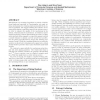Free Online Productivity Tools
i2Speak
i2Symbol
i2OCR
iTex2Img
iWeb2Print
iWeb2Shot
i2Type
iPdf2Split
iPdf2Merge
i2Bopomofo
i2Arabic
i2Style
i2Image
i2PDF
iLatex2Rtf
Sci2ools
109
click to vote
SOUPS
2009
ACM
2009
ACM
Games for extracting randomness
Randomness is a necessary ingredient in various computational tasks and especially in Cryptography, yet many existing mechanisms for obtaining randomness suffer from numerous problems. We suggest utilizing the behavior of humans while playing competitive games as an entropy source, in order to enhance the quality of the randomness in the system. This idea has two motivations: (i) results in experimental psychology indicate that humans are able to behave quite randomly when engaged in competitive games in which a mixed strategy is optimal, and (ii) people have an affection for games, and this leads to longer play yielding more entropy overall. While the resulting strings are not perfectly random, we show how to integrate such a game into a robust pseudo-random generator that enjoys backward andforward security. We construct a game suitable for randomness extraction, and test users playing patterns. The results show that in less than two minutes a human can generate 128 bits that are ...
Related Content
| Added | 28 May 2010 |
| Updated | 28 May 2010 |
| Type | Conference |
| Year | 2009 |
| Where | SOUPS |
| Authors | Ran Halprin, Moni Naor |
Comments (0)

